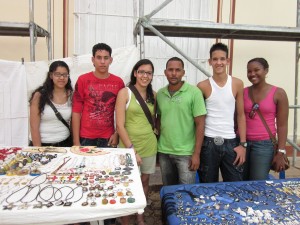Navigating Cuba as a Caribbean Woman: Puerto Rican
May 4, 2012 by isnietorosas
Before this trip and this class I was not foreign to race issues in Cuba or in the rest of the Caribbean for that matter. My freshman year here at Vassar I wrote a paper on the history of race relations in Cuba for my English class and also watched a PBS episode on being Black in Latin America with a specific segment on Cuba. My last conversation with a Vassar professor before flying to Cuba was about a trip she had to the island and the experiences of a female Puerto Rican student that was part of the group. In her story she relayed how this student felt uncomfortable constantly being labeled a Cuban and having to explain to many that she was in fact American. A couple of days into the trip, this student was ready to leave. I contemplated on these experiences before leaving to Cuba and I thought myself mentally prepared to possibly experience the “blatant racism” I had read about and everyone talked about.
I couldn’t have imagined that from day one in Havana and for the next two weeks I would undergo a constant internal struggle with the Cuban system but perhaps most shockingly with myself. Just in a brief disclaimer, besides traveling back and forth my entire life from my native Puerto Rico to my parent’s home in Connecticut, Cuba was my first time outside the United States and while I am sure my experience in Cuba is not unique to the Island, I can only based my opinions on this trip and nothing more.
My frustrations did not rise from being labeled Cuban; on the contrary, throughout this trip I enjoyed the ability to surpass the normal Cuban and tourist interactions because of my skin color and my native Spanish skills. I loved the easiness in which I could maneuver around in smaller groups without being hassled. In many occasions, specifically in the providences, as I walked around translating for my peers I constantly found myself explaining to the locals that I was in fact not their “guía” but rather their fellow student at a North American University and that I was not Cuban but actually Puerto Rican. This elicited a number of responses but all full of excitement that even if I wasn’t the tour guide I was still a Caribeña and this identity allowed me to breach the barriers between local and foreigner.
What really bothered me; however, was understanding fully well that the difficulties I was encountering in the more heavily tourist area was something that Afro-Cubans and just darker skinned Cubans in general experience on a daily basis. In my very first day in Havana, before being rushed off to see the ballet, I went to the main desk to see if they could exchange some money. Thinking that using my spanish would get me some CUC’s I asked the lady at the counter if I could exchange 50 american dollars. Not looking up at me, she quickly and dismissively informed me that she couldn’t exchange my money. Not thinking much of it I walked away but soon realized that Nick, my white classmate, was at the desk exchanging money with the same desk attendant I had approached. A bit confused I approached Professor Cohen and it took her intervention for me to get some CUC’s. It was my first experience in Cuba not being treated with the same level of attention or even respect than my classmates simply because I was perceived as Cuban and thus not a tourist and it was something that frankly persisted regardless of what region of the island we were on. While I often used it as a conversation starter, I once had an entire conversation with a young Cuban about what exactly was the Cuban term for my skin color after he informed me that I had a “Cuban color”, I couldn’t help but feel frustrated about my treatment because it was the same treatment non-white Cubans were getting. This frustration peaked towards the end of the trip when members of the hip hop group Hermanasos were not allowed to come to the rooftop of the hotel because “Cubans were not allowed in the hotel” despite the fact that hours prior a white Cuban had given us a lecture on the rooftop.
Looking back I wouldn’t trade the easiness of starting a conversation with regular people out in the streets or the warmth I received when I proudly identified myself as a puertoriqueña for better treatment in the tourist sector but I do wonder as the tourist sector continues to expand, will race relations in Cuba worsen? Ironically, the perfect conclusion to my Cuban experience occurred in Miami, when the US customs agent, American passport (with place of birth as Yauco Puerto Rico) in hand, sternly asked me if I had family in Havana? I couldn’t help but smile, even in the US I was Cuban.
Leave a Reply
You must be logged in to post a comment.
